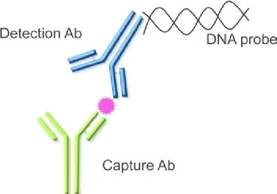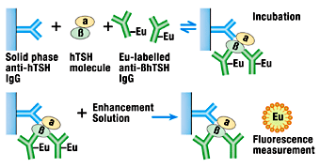Other Immunoassays
Lumit™
Lumit™ Immunoassays are based on NanoLuc® Binary Technology. In this system, antibodies are chemically labeled with small and large subunits of luciferase, known as SmBiT and LgBiT. When an analyte is present, the antibodies come into close proximity, allowing SmBiT and LgBiT to assemble into an active enzyme that produces a bright luminescent signal. This proximity-based design enables sensitive, rapid, and reliable detection.
Compared to conventional immunoassays, Lumit™ offers several key advantages. It uses a simple add-mix-read protocol that eliminates washing steps, enabling direct analyte measurement in either cell culture or media collected from cells. The assay provides highly sensitive luminescence detection across a wide dynamic range, while also allowing simultaneous assessment of cell growth and protein expression or changes.
In addition, Lumit™ assays can be customized for a variety of research applications, including the detection of cytokines, intracellular proteins, and signaling molecules, making them a versatile tool for both basic and applied research.
Designed for sensitive and reliable measurement of proteins, cytokines, and signaling molecules, Lumit™ enables rapid results with minimal hands-on time.
Proteomic Proximity Ligation Assay (PLA)
Quantification of up to 96 proteins in 96 samples simultaneously: high grade multiplexing with no trade-off in data quality, saving time and sample by simultaneously analyzing multiple proteins
Exceptional specificity: based on the proprietary proximity ligation assay
Minimal sample consumption: target proteins can be examined in as little as 1 µL of precious samples such as serum, plasma, tissue, etc.
High throughput: 9,216 data-points generated per run (96 proteins in 96 samples), discovering accurate information about novel gene expression patterns at the protein level
Highly sensitive: unravel low-abundance proteins


This workflow illustrates the Olink® Proximity Extension Assay (PEA) process: starting from cell lysis, probes bind and extend in the presence of target proteins, followed by amplification and detection through qPCR. The resulting data is analyzed to quantify protein levels with high sensitivity and specificity.
Immuno-PCR (PicoLISA)
Ultrasensitive detection: iPCR enables the measurement of ultra-low quantities of antigens with exceptional precision.
ELISA + PCR advantages: combining the specificity and simplicity of ELISA with the sensitivity and adaptability of PCR, iPCR offers superior performance over conventional methods.
Ready-to-use solutions: although historically under-utilized due to limited commercial availability, we provide validated iPCR conversion kits and PicoLISA iPCR kits to support reliable adoption.
PicoLISA platform: this innovative assay combines ELISA’s ease-of-use with the sensitivity of real-time PCR, requiring only one-tenth the sample volume while delivering up to 10× greater sensitivity than traditional ELISA.

Illustration of an iPCR/PicoLISA assay format, where a capture antibody binds the target antigen and a detection antibody is linked to a DNA probe, enabling highly sensitive signal amplification through PCR.
Dissociation Enhanced Lanthanide Fluorescent Immunoassay (DELFIA)

Illustration of the DELFIA assay workflow: target molecules are captured by solid-phase antibodies and detected with europium-labeled antibodies. Following incubation and enhancement, fluorescence is measured for highly sensitive quantification.
DELFIA is a heterogeneous, time-resolved fluorescence (TRF) assay that detects reagents labeled with lanthanide chelates (Eu, Tb, Sm).
It provides excellent flexibility for applications requiring high sensitivity, specificity, reliability, and reproducibility. DELFIA is particularly well-suited for complex sample matrices and is widely used in TRF, kinase, and immunodetection assays, as well as discovery research.
With its wide dynamic range, DELFIA is also ideal for post-screening applications, including PK, ADA, biomarker analysis, and cell-based assay support.
For more information about other immunoassays, please contact info@axelabio.com